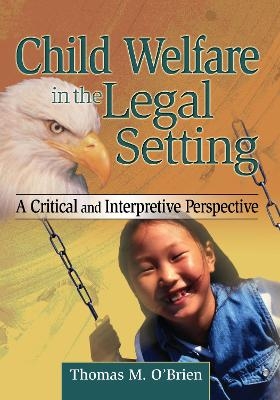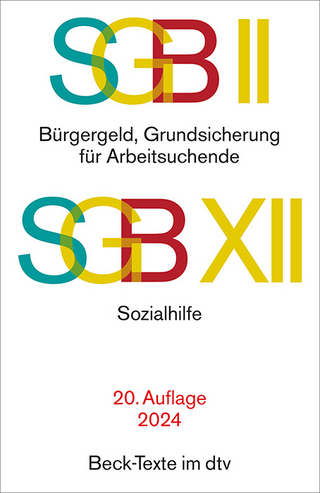
Child Welfare in the Legal Setting
Routledge (Verlag)
978-0-7890-0147-4 (ISBN)
- Titel z.Zt. nicht lieferbar
- Versandkostenfrei innerhalb Deutschlands
- Auch auf Rechnung
- Verfügbarkeit in der Filiale vor Ort prüfen
- Artikel merken
Child Welfare in the Legal Setting: A Critical and Interpretive Perspective is a revolutionary study of the child welfare system that is essential for practitioners, educators, and students interested in public child welfare work. It examines the legal system surrounding child welfare workers and highlights their need for agency-specific training. This insightful book challenges the traditional rules of child welfare and paves the way for alternate methods of conceptualizing and organizing child protection. It explores why many family interventions fail and others never even occur. By identifying incongruities between the philosophy of child welfare and its function, this book advocates a more individualistic and efficient technique for assisting clients. Addressing issues and challenges from the initial identification of problems to navigating the legal system, this book is also thorough enough for public child welfare workers who want to take their skills to the next level.
The large-system perspective in this book uses the concentric circle model, the rational legal model of legal and court action, and the ritualized process model to examine child welfare practice. Learn why terms such as child abuse and neglect have become social constructions that vary depending on the values of social workers, judges, attorneys, agencies, and communities. Child Welfare in the Legal Setting: A Critical and Interpretive Perspective examines the standardization of the organizational activities of child welfare systems and how this limits professionals’ ability to accurately recognize unique problems and intervene in the most beneficial manner.
Child Welfare in the Legal Setting also provides controversial opinions on emerging issues including:
family investigations
sanction for Child Protective Services intervention
the legal setting as a host environment
the function of the child welfare system
rationalization of child welfare intervention
trained incapacity of social workers
Title IVE programs
the court system
Child Welfare in the Legal Setting: A Critical and Interpretive Perspective identifies vital issues by analyzing the ethical and moral foundations of the child welfare system. This insightful book also takes a close look at how practitioners inadvertently devalue their clients by using language that creates stigmatized social categories such as victim and convicted felon. Supervisors, managers, social workers and child welfare practitioners will benefit from this information. The vignettes that supplement the narrative also make the book an important resource in any child welfare course.
Thomas M. O’Brien, MSW, MBA, DPA, LCSW, is Assistant Professor at California State University, Chico. He holds a Master of Social Work degree from Saint Louis University, a Master of Business Administration degree from San Jose University, and a Doctor of Public Administration degree from the University of Southern California.
Preface and Acknowledgments
Chapter 1. Beginnings
Introduction
The Book: An Overview
Some Important Concepts or Assumptions
The Individual As Constructing Meaning
Abstract Systems
Social Institutions As Abstract Systems
The Social and Cultural World
Conclusion
SECTION I: SANCTION, AUTHORITY, AND THE LEGAL SYSTEM
Chapter 2. The Institutional Context of Child Welfare
Global Perspectives
Child Well-Being at Societal, Institutional, and Family Levels
International Perspectives on Protecting Children from Parents/Caretakers
Child Abuse and Neglect As Social Categories
The American Child Welfare System
The Organization of Child Welfare Programs
Conclusion
Chapter 3. Governance, Legitimacy, and Trust
Introduction
The American System: A Focus on Parental or Caretaker Behavior
Child Protective Services As Child Welfare
Child Welfare As an Industry
Prevention
American Child Welfare As Intervention into Family Life
Constitutional Rights
Conclusion
Chapter 4. Multiple Dimensions of Child Welfare Governance
Introduction
The Constitution and Fragmented Authority
The Federalist Structure
The Administrative Structure
Law and Policy by Appellate Decisions
Legislation by Oversight
Conclusion
Chapter 5. The Organizational Context of Practice
Introduction
The Community As a Context for Child Welfare
The Industrialization of Child Welfare
The Effects of Industrialization: Alienation, Trained Incapacity, and Case Production
The Social Worker’s Role As Mediating Levels of Organization
Conclusion
Chapter 6. The Legal System As Host Setting: Context and History
Introduction
Practice in a Host Setting
Tensions: Social Workers in Court Settings
History of the Social Work Profession
Conclusion
Chapter 7. Images and Realities of the Legal System: Metaphor, Myths, and Stereotypes
Introduction
Stereotypes: Their Nature and Action
Understanding Conflict Between Social Workers and Attorneys
Social Work in Public Child Welfare
Conclusion
SECTION II: COURTS, MODELS, AND RITUALS
Chapter 8. The Courts
Introduction
The Varieties of Courts
Child Welfare Courts: Nonvoluntary Interventions
Voluntary Child and Family Courts
Ancillary Courts and Legal Issues
Litigation: Social Work Liability, Forensic Responsibility, and Agency Action
Administrative Reviews: Schools, Welfare, Social Services, Etc.
Conclusion: Courts As a Labyrinth
Chapter 9. The Concentric Systems View of Child Welfare
Introduction
Background or Theoretical Underpinnings
The Concentric Systems Model
Dynamics of the Model
Applying the Model
A System Overview Using the Concentric Systems Model
Summary
Chapter 10. The Rationalization of Child Welfare Intervention
Introduction
The Rational Model
The Court Personnel
The Social Service
Conclusion
Chapter 11. Life in Drama and Narrative: Meaning, Self, and Identity
Introduction
Behavior As Drama and Narrative
Child Welfare As Intervention in Social Dramas
Conclusion
Chapter 12. Social Intervention As Ritualized Action
Introduction
The Ritual Process Model
Conclusion
SECTION III: ETHICS, VALUES, AND CONCLUSIONS
Chapter 13. Ethics, Values, and Integrity
Introducti
| Erscheint lt. Verlag | 5.11.2004 |
|---|---|
| Verlagsort | New York |
| Sprache | englisch |
| Maße | 148 x 210 mm |
| Gewicht | 635 g |
| Themenwelt | Recht / Steuern ► Arbeits- / Sozialrecht ► Sozialrecht |
| Recht / Steuern ► EU / Internationales Recht | |
| Recht / Steuern ► Privatrecht / Bürgerliches Recht ► Familienrecht | |
| Sozialwissenschaften ► Soziologie ► Mikrosoziologie | |
| ISBN-10 | 0-7890-0147-0 / 0789001470 |
| ISBN-13 | 978-0-7890-0147-4 / 9780789001474 |
| Zustand | Neuware |
| Haben Sie eine Frage zum Produkt? |
aus dem Bereich


